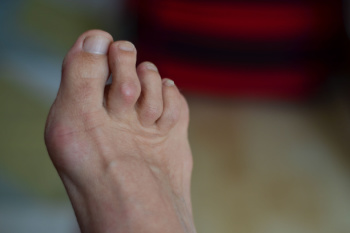
Hammertoe deformities are one of the most common issues affecting the lesser toes, typically causing the joint in the middle of the toe to bend downward, resembling a hammer. This condition often results from an imbalance in the muscles, tendons, or ligaments that normally keep the toes straight. Causes include wearing tight or ill-fitting shoes, injuries, or underlying conditions such as arthritis or high arches. Symptoms include pain, stiffness, and difficulty straightening the affected toe. Over time, the deformity can cause friction against shoes, leading to painful corns, calluses, and inflammation. Pain occurs due to increased pressure on the bent joint and surrounding tissues. To relieve discomfort, one can switch to wider shoes with a soft, roomy toe box and use orthotic inserts. In severe cases, surgery may be needed to realign the joint and restore normal toe function. If you have a painful hammertoe, it is suggested that you visit a podiatrist for an exam and treatment.
Hammertoe
Hammertoes can be a painful condition to live with. For more information, contact one of our podiatrists from Bruening Foot & Ankle. Our doctors will answer any of your foot- and ankle-related questions.
Hammertoe is a foot deformity that affects the joints of the second, third, fourth, or fifth toes of your feet. It is a painful foot condition in which these toes curl and arch up, which can often lead to pain when wearing footwear.
Symptoms
- Pain in the affected toes
- Development of corns or calluses due to friction
- Inflammation
- Redness
- Contracture of the toes
Causes
Genetics – People who are genetically predisposed to hammertoe are often more susceptible
Arthritis – Because arthritis affects the joints in your toes, further deformities stemming from arthritis can occur
Trauma – Direct trauma to the toes could potentially lead to hammertoe
Ill-fitting shoes – Undue pressure on the front of the toes from ill-fitting shoes can potentially lead to the development of hammertoe
Treatment
Orthotics – Custom made inserts can be used to help relieve pressure placed on the toes and therefore relieve some of the pain associated with it
Medications – Oral medications such as anti-inflammatories or NSAIDs could be used to treat the pain and inflammation hammertoes causes. Injections of corticosteroids are also sometimes used
Surgery – In more severe cases where the hammertoes have become more rigid, foot surgery is a potential option
If you have any questions please contact our offices located in Covina and Alta Loma, CA . We offer the newest diagnostic and treatment technologies for all your foot and ankle needs.
